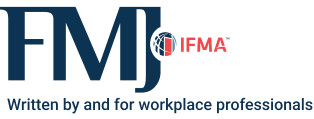On Standards
ISO 41000 FM Standards Series: We've only just begun
In November 2020, the ISO technical committee for Facility Management, ISO/TC 267, held its 13th plenary meeting via a virtual platform. Regardless of the superstition surrounding 13, it was not unlucky, but a time of reflection and celebration.
At the end of 2020, TC 267’s first chair, Stan Mitchell of Key FM, stepped down from the role after nine years. The technical committee unanimously approved a resolution to acknowledge and thank him for his vision, leadership and commitment to the FM profession. The committee also celebrated five published documents (four standards and a technical report) and welcomed new members.
The early days
In his closing remarks at November’s meeting, Mitchell summed up the journey to date. The number 13 represents 10 years of hard work by dedicated, like-minded professionals with a shared vision of elevating the professional discipline through standardization.
He explained that the journey began with four objectives:
-
Build on the 'Partners in FM Excellence' collaboration between the British Institute of Facilities Management (now Institute of Workplace and Facilities Management), IFMA and FMA Australia;
-
Build on the FM Standards, EN 15221 (Parts 1 to 7), published by CEN TC 348 in Europe, and raise the bar to a global level;
-
Raise the awareness, understanding and credibility of FM as a strategic professional discipline; and
-
Create an international platform to develop FM benchmark standards that demonstrate the professionalism and credibility of the industry.
The journey of a thousand miles begins with a single step… ~Lao Tzu
The ISO technical committee for FM was established in 2012. The beginning was not without its challenges, chief among them being the need to convince the ISO technical management board that facility management is fundamentally different from asset management, a discipline that had an established technical committee, TC 251. Because of the difference, FM deserved its own technical committee and unique standards. ISO/TC 267 began with 29 member countries (20 participating members and nine observing members).
The first standards were published in 2017. With its foundation in the CEN standards, EN 15221-1 and EN 15221-2, the first FM global standards were published (ISO 41011, ISO 41012, ISO/TR 41013) and, with them, the first consensus-based definition of FM. At this point, TC 267 had grown to 41 member countries (26 participating, 15 observing).
With the publication of ISO 41001 in 2018, the industry received the first specific FM management system to address its own opportunities and challenges. This standard provides FMs a systematic framework for designing, managing and improving FM programs to better support the demand organizations they serve.
Demand organization: entity which has a need and the authority to incur costs to have requirements met. [source: ISO 41011 Facility Management – Vocabulary]
Rising to the challenges presented by COVID-19, TC 267/WG4 completed ISO 41014 ahead of schedule. This document was published in September 2020.
Considering this timeline, it seems the standards development process is too slow and bureaucratic. The five-year gap between establishing TC 267 and the first publications (2012-2017) might support that belief. Rome was not built in a day, and FM organizations or the standards that support them will not be either.
The first steps in this journey were necessary and deliberate. While the consensus-based process might appear slow and even frustrating to some, the outcome is a document that supports and promotes a shared understanding of FM practices and processes between functional areas within organizations, between practitioners and suppliers, and even between countries and cultures.
 Today
Today
Because of the vision and dedication of FM professionals like Stan Mitchell and the other TC members, the past nine years laid the foundation for work to continue. TC 267 is comprised of 48 member countries, has overcome its growing pains, and work progresses at an accelerated pace.
The FM management system standard, ISO 41001, is not just a strategic tool for FM professionals. The strategy behind the development of new projects is based on this framework as well.
What that means for the industry is the development of a body of work that:
-
Demonstrates FM’s value FM and the opportunities for outcomes that positively impact "the built environment with the purpose of improving the quality of life of people and the productivity of the core business." [ISO 41011]
-
Guides the development of highly effective FM functions that are aligned to the strategic objectives of the demand organization and demonstrates leadership in influencing culture.
-
Supports a robust planning framework and the implementation of FM functions and services.
-
Supports consistent and comprehensive operations of the FM organization.
-
Provides a framework for measuring, monitoring and improving the FM function.
The journey continues
While TC 267’s membership continues growing, the reality is that the pipeline of work is almost outpacing the capacity, but work is certainly not slowing down. As momentum builds, the road ahead is becoming clearer, and the steps in the journey are rapidly unfolding.
-
ISO 41011 Facility management – Vocabulary
-
ISO 41012 Facility management – Guidance on strategic sourcing and the development of agreements
-
ISO/TR 41013 Facility management – Scope, key concepts and benefits
-
ISO 41001 Facility management – Management system – Requirements with guidance for use
-
ISO 41014 Facility management – Development of a facility management strategy
-
ISO 41015 Facility management – Influencing organizational behaviors for improved facility outcomes and user experience
-
ISO/TR 41016 Technology in facility management – Scope, key concepts and benefits
-
ISO 41017 Facility management – Guidance on emergency management of epidemic prevention in the workplace
-
ISO 41018 Facility management – Development of a facility management policy
-
ISO/TR 41019 Facility management – The role of FM in sustainability and resilience
-
ISO 41020 Facility management – Performance measurement and management for improved facility outcomes

What's in it for you (WIIFY)
I was recently asked about the value of becoming involved in developing standards. My first impulse was to reiterate all of the typical reasons – elevate the profession, develop a common language and global understanding of practices and processes, streamline processes, optimize resource use, foster confidence in service delivery and improve transparency. All of these are true. However, my answer has three parts.
1. Someone is going to standardize FM. It can be done for you, or you can do it.
Someone does not necessarily mean TC 267. Many FM-related organizations are developing standards that impact the profession. Consider that, within the family of ISO management system standards alone, there are at least seven requirement standards related to FM functions. There is a technical committee behind each of these standards responsible for standardization in their domain.

ISO 9001, Quality
-
ISO 14001, Environmental management
-
ISO 22301, Business continuity
-
ISO 45001, Health and Safety
-
ISO 46001, Water efficiency
-
ISO 50001, Energy management
-
ISO 55001, Asset management
Without a close collaboration with the FM industry during the development process (preferably a seat at the table), FM concerns, needs and requirements to effectively manage the built environment will be overlooked.
2. Standards can jumpstart Knowledge Management (KM) Strategy. In the May/June 2019 issue of IFMA's FMJ, I wrote about the risk of not having a KM strategy for your organization and the FM industry. Sixty-six percent of projects suffer from delays of one week in length (and 12 percent of a month or more) because of unshared knowledge. Adopting FM standards for processes and FM functions, establishes common ground with staff, the organization and external stakeholders.
3. This will be my 10th year working with ISO/TC 267. In no other professional experience have I found the saying, "the whole is greater than the sum of its parts,"to be more true. Throughout this journey, I have formed a network of incredible, intelligent, genuine colleagues spanning the globe. They are ready and willing to help, to share their knowledge, their time and their talent. They celebrate professional and personal achievements and to support me through challenges. But most importantly, they are the true embodiment of FM’s definition:
an organizational function which integrates people, place and process within the built environment with the purpose of improving the quality of life of people and the productivity of the core business". [ISO 41011]
When I invite you to join me on this journey, I invite you into this community of friends (and even family). Ask me about my journey and how you can get involved. I guarantee you will receive more than you give.

Laverne Deckert is an Independent consultant, working with organizations to creatively respond to their challenges. She has led research, educational programs, standards, and community development initiatives in the corporate real estate and FM industry. Her primary goal is to bring value to every interaction. Her colleagues value her curiosity and creativity, ability to organize complex information, to facilitate teams in meaningful collaboration, and her focus on strategic goals. Deckert currently as Administrator for the U.S. Technical Advisory Group Administer on behalf of the American National Standards Institute (ANSI) for ISO/TC 267 and as the convenor for ISO/TC 267/AG 1 – Roadmap Advisory Group.
References
International Organization for Standardization
The European Committee for Standardization's (CEN)technical committee for Facilities Management
Working Group for TC 267, Strategy and Planning
Milton, Nick. (2018, July 23). Cost of Lost Knowledge Could Be $47 Million per year. Knoco Stories. Retrieved from: com/2018/07/cost-of-lost-knowledge-could-be-47.html#ixzz5i5SHHq3S
Read more on Standards
Explore All FMJ Topics





